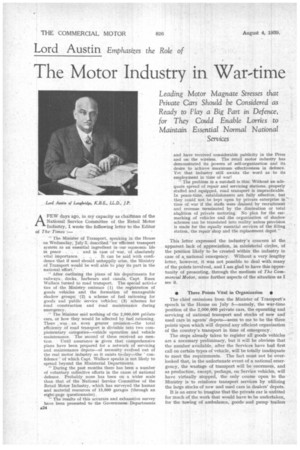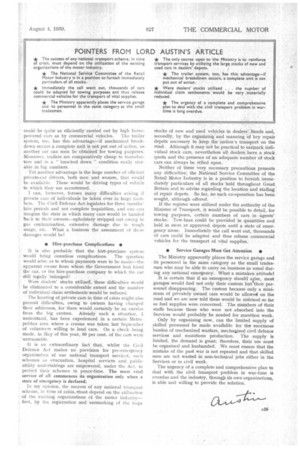Lord Austin Emphasizes the Role of
Page 26

Page 27

If you've noticed an error in this article please click here to report it so we can fix it.
The Motor Industry in War-time
Leading Motor Magnate Stresses that Private Cars Should be Considered as Ready to Hay a Big Part in Defence, for They Could Enable Lorries to Maintain Essential Normal National Services A
FEW days ago, in my capacity as chaitma,n of the i Na.tional Service Committee of the Retail Motor . Industry, I wrote the following letter to the Editor of The Times :— The Minister of Transport, speaking in the House on Wednesday, July 5, described 'an efficient transport system as an essential ingredient in our economic life in peace . . . and in case of war, of absolutely vital importance. . . . It can be said with confidence that if need should unhappily arise, the Ministry of Transport would be well able to play its part in the national effort.'
" After outlining the plans of his departments for railways, docks, harbours and canals, Capt. Euan Wallace turned to road transport. The special activi-* ties of the Ministry embrace (1) the registration of goods vehicles and the formation of manageable shadow groups; (2) a scheme of fuel rationing for goods and public service vehicles; (3) schemes for road construction and road maintenance during emergency,
" The Minister said nothing of the 2,000,000 private cars, or how they would be affected by fuel rationing. There . was an even greater omission—the total efficiency of road transport is divisible into two cornplementary categories—vehicle operation and vehicle maintenance. The second of these received no men
tion. Until assurance is given that comprehensive plans have been prepared for a network of servicing and maintenance depots—of necessity evolved out of the real motor industry as it exists to-day—the ' confidence ' of which Capt. Wallace speaks is not likely to spread beyond the Ministerial Departments.
" During the past months there has been a number of voluntary collective efforts in the cause of national defence. Probably none has been on a wider scale than that of the National Service Committee of the Retail Motor Industry, which has surveyed the human and material resources of 15,000 garages (through an eight-page questionnaire).
" The results of this accurate and exhaustive survey have been presented to the Government Departments 44 and have received considerable publicity in the Press and on the wireless. The retail motor industry has demonstrated its powers of self-organization and its desire to achieve maximum effectiveness in defence. Yet that industry still awaits the word as to its employment in time of war!
"The problem in a nutshell is this: Without an adequate spread of repair and servicing stations, properly staffed and equipped, road transport is impracticable. In peace-time, establishments are fully effective, but they could not be kept open by private enterprise in time of war if the staffs were drained by recruitment and revenue terminated by the diminution or total abolition of private motoring. No plan for the earmarking of vehicles and the organization of shadow schemes can be translated into reality unless provision is made for the equally essential services of the filling station, the repair shop and the replacement depot."
This letter expressed the industry's concern at the apparent lack of appreciation, in ministerial circles, of the position likely to be created within the industry in case of a, national emergency. Without a very lengthy letter, however, it was not possible to deal with many of the points involved, and I am glad to have this opportunity of presenting, through the medium of The Commercial Motor, some further aspects of the situation as I see it.
• Three Points Vital in Organization •
The chief omissions from the Minister of Transport's speech in the House on July 5—namely, the war-time position of the 2,000,000 private cars, the operating and servicing of national transport and stocks of new and used cars in agents' depots—seem to me to be the three points upon which will depend any efficient organization of the country's transport in time of emergency.
The steps already taken to register all goods vehicles are a necessary preliminary, but it will be obvious that the number available, after the Services have had first call on certain types of vehicle, will be totally inadequate to meet the requirements. The fact must not be overlooked that, in the unfortunate event of a national emergency, the wastage of transport will be enormous, and as production, except, perhaps, on Service vehicles, will have virtually stopped, the only course open to the Ministry is to reinforce transport services by utilizing the large stocks of new and used cars in dealers' depots.
It is an error to imagine that the private car is unfitted for much of the work that would have to be undertaken, for the towing of ambulance, goods and pump trailers could be quite as efficiently carried out by high horsepowered cars as by commercial vehicles. The trailer system, too, has this advantage—if mechanical breakdown occurs a complete unit is not put out of action, as another car can soon be obtained for towing purposes. Moreover, trailers are comparatively cheapto manufacture and in a " knocked down' condition easily storable in big numbers.
Yet another advantage is the large number of efficient private-car drivers, both men and women, that would be available. These would be driving types of vehicle to which they are accustomed.
I can, however, foresee many difficulties arising if private cars of individuals be taken over in large numbers. The Civil Defence Act legislates for three months' hire periods and not complete requisition, and one can imagine the state in which many cars would be handed back to their owners—upholstery stripped out owing to gas contamination, extensive damage due to rough usage, etc. What a business the assessment of these damages would be!
• Hire-purchase Complications •
It is also probable that the hire-purchase system would bring countless complications. The question would arise as to whom payments were to be made—the apparent owner from whom the Government had hired the car, or the hire-purchase company to which the car still legally belonged?
Were dealers' stocks utilized, these difficulties would be eliminated to a considerable extent and the number of individual claim settlements would be reduced.
The locating of private cars in time of crisis might also present difficulties, owing to owners having changed their addresses, for there would certainly be an exodus from the big centres. Already such a situation, 1 understand, has been experienced in a certain Metropolitan area where a census was taken last September of volunteers willing to lend cars. On a check being made, in May of this year, 50 per cent. of the cars were
• untraceable.
It is an extraordinary fact that, whilst the Civil Defence Act makes no provision for pre-emergency organization of our national transport services, such schemes as evacuation, hospital services and public utility undertakings are empowered, under the Ad, to perfect their schemes in peace-time. The most vital service of all commences its organization only when a state of emergency is declared.
In my opinion, the success of any national transport scheme, in time of crisis/must depend on the utilization of the existing organizations of the motor industry— first, by the registration and earmarking of the huge
stocks of new and used vehicles in dealers' hands and, secondly', by the organizing and manning of key repair depots necessary to keep the nation's transport on the road. Although it may not be practical to earmark individual stock cars, nevertheless all dealers have a stock quota and the presence of an adequate number of stock cars can always be relied upon.
Neither of these very necessary precautions presents any difficulties; the National Service Committee of the Retail Motor Industry is in a position to furnish immediately particulars of all stocks held throughout Great Britain and to advise regarding the location and staffing of repair depots. So far, no such co-operation has been sought, although offered.
If the register were utilized under the authority of the Minister of Transport, it would be possible to detail, for towing purposes, certain numbers of cars in agents' stocks. Tow-bars could be provided in quantities and held in store at approved depots until a state of emergency arose. Immediately the call went out, thousands of cars could be adaptect and thus release commercial vehicles for the transport of vital supplies.
• Service Garages Must Get Attention •
The Ministry apparently places the service garage and its personnel in the same category as the small tradesmen who may be able to carry on business as usual during any national emergency. What a mistaken attitude!
It is certain that if an emergency should arise, most garages would find not only their custom but their personnel disappearing. The custom because only a minimum of privately owned cars would be allowed on the road and we are now told these would be rationed so fax as fuel supplies were concerned. The members of their staffs because those who were not absorbed into the Services would probably be needed for munition work.
Only by organizing now, can the limited supply of skilled personnel be made available for the enormous 'burden of mechanized warfare, mechaulzed civil defence services and munitions production. The supply is limited, the demand is great; therefore, their use must be organized and husbanded. We must ensure that the mistake of the past war is not repeated and that skilled men are not wasted in non-technical jobs either in the Services or in civil work.
The urgency of a complete and comprehensive plan to deal with the civil transport problem in war-time is overdue and the industry, througb its own organizations, is able and willing to provide the solution.




































































